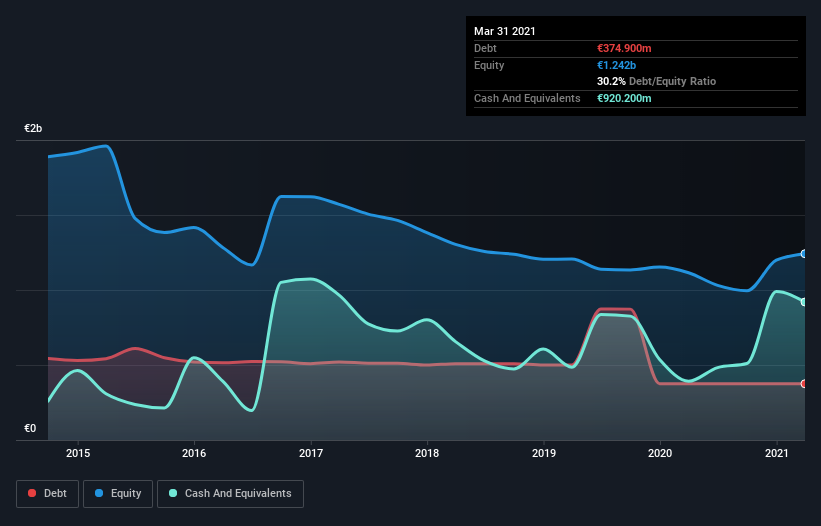
Warren Buffett famously said, 'Volatility is far from synonymous with risk.' So it might be obvious that you need to consider debt, when you think about how risky any given stock is, because too much debt can sink a company. We can see that Bilfinger SE (ETR:GBF) does use debt in its business. But the more important question is: how much risk is that debt creating?
When Is Debt Dangerous?
Generally speaking, debt only becomes a real problem when a company can't easily pay it off, either by raising capital or with its own cash flow. Ultimately, if the company can't fulfill its legal obligations to repay debt, shareholders could walk away with nothing. However, a more common (but still painful) scenario is that it has to raise new equity capital at a low price, thus permanently diluting shareholders. Having said that, the most common situation is where a company manages its debt reasonably well - and to its own advantage. When we examine debt levels, we first consider both cash and debt levels, together.
View our latest analysis for Bilfinger
What Is Bilfinger's Debt?
You can click the graphic below for the historical numbers, but it shows that Bilfinger had €328.3m of debt in March 2021, down from €375.7m, one year before. But it also has €920.2m in cash to offset that, meaning it has €591.9m net cash.

How Healthy Is Bilfinger's Balance Sheet?
According to the last reported balance sheet, Bilfinger had liabilities of €1.17b due within 12 months, and liabilities of €866.7m due beyond 12 months. Offsetting these obligations, it had cash of €920.2m as well as receivables valued at €926.5m due within 12 months. So it has liabilities totalling €191.2m more than its cash and near-term receivables, combined.
This deficit isn't so bad because Bilfinger is worth €935.0m, and thus could probably raise enough capital to shore up its balance sheet, if the need arose. But it's clear that we should definitely closely examine whether it can manage its debt without dilution. While it does have liabilities worth noting, Bilfinger also has more cash than debt, so we're pretty confident it can manage its debt safely.
And we also note warmly that Bilfinger grew its EBIT by 20% last year, making its debt load easier to handle. When analysing debt levels, the balance sheet is the obvious place to start. But it is future earnings, more than anything, that will determine Bilfinger's ability to maintain a healthy balance sheet going forward. So if you want to see what the professionals think, you might find this free report on analyst profit forecasts to be interesting.
Finally, while the tax-man may adore accounting profits, lenders only accept cold hard cash. Bilfinger may have net cash on the balance sheet, but it is still interesting to look at how well the business converts its earnings before interest and tax (EBIT) to free cash flow, because that will influence both its need for, and its capacity to manage debt. Over the most recent three years, Bilfinger recorded free cash flow worth 71% of its EBIT, which is around normal, given free cash flow excludes interest and tax. This cold hard cash means it can reduce its debt when it wants to.
Summing up
While Bilfinger does have more liabilities than liquid assets, it also has net cash of €591.9m. The cherry on top was that in converted 71% of that EBIT to free cash flow, bringing in €142m. So is Bilfinger's debt a risk? It doesn't seem so to us. There's no doubt that we learn most about debt from the balance sheet. However, not all investment risk resides within the balance sheet - far from it. For example, we've discovered 3 warning signs for Bilfinger that you should be aware of before investing here.
If, after all that, you're more interested in a fast growing company with a rock-solid balance sheet, then check out our list of net cash growth stocks without delay.
If you decide to trade Bilfinger, use the lowest-cost* platform that is rated #1 Overall by Barron’s, Interactive Brokers. Trade stocks, options, futures, forex, bonds and funds on 135 markets, all from a single integrated account. Promoted
Valuation is complex, but we're here to simplify it.
Discover if Bilfinger might be undervalued or overvalued with our detailed analysis, featuring fair value estimates, potential risks, dividends, insider trades, and its financial condition.
Access Free AnalysisThis article by Simply Wall St is general in nature. It does not constitute a recommendation to buy or sell any stock, and does not take account of your objectives, or your financial situation. We aim to bring you long-term focused analysis driven by fundamental data. Note that our analysis may not factor in the latest price-sensitive company announcements or qualitative material. Simply Wall St has no position in any stocks mentioned.
*Interactive Brokers Rated Lowest Cost Broker by StockBrokers.com Annual Online Review 2020
Have feedback on this article? Concerned about the content? Get in touch with us directly. Alternatively, email editorial-team (at) simplywallst.com.
About XTRA:GBF
Bilfinger
Provides industrial services to customers in the process industry primarily in Europe, North America, and the Middle East.
Flawless balance sheet and undervalued.
Similar Companies
Market Insights
Community Narratives




